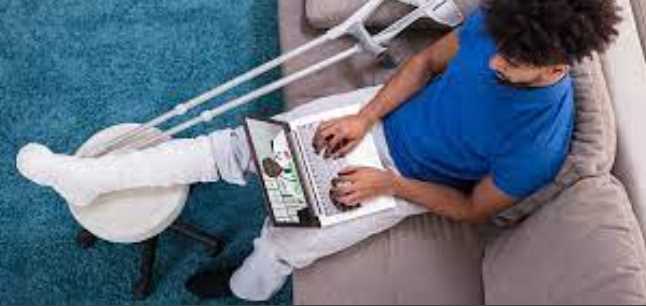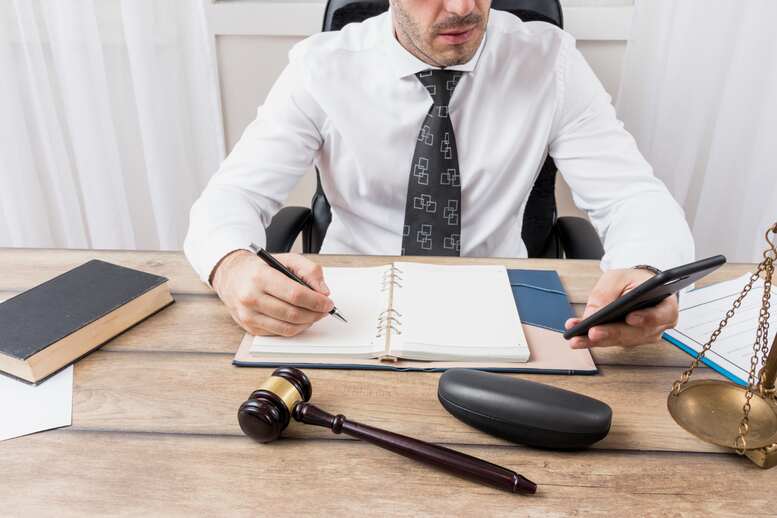Law
Tips To Maximize Your Personal Injury Compensation

Regardless of its extent, personal injury can be scary. We all dread the thought of nursing injuries, especially if it means you can’t go about your routine as usual. When a personal injury hits, it can turn your life inside out. Whether you or your loved one, you need to protect your rights and ensure you receive fair compensation. Personal injury cases are never straightforward, not even when the incident seems obvious. As such, you need to take the proper steps to ensure the responsible party is held accountable and you get compensated. The process basically entails establishing that the injuries are due to a negligent act and that they affected your life. While this sounds straightforward, most people hardly get compensation amounts matching the injuries. Here are some tips you can include in your strategy to ensure you realize the best compensation.
Know what you are dealing with
Were you injured in an auto accident? While auto accidents are the most common personal injury cases, they aren’t the only ones. You could be dealing with injury resulting from:
- Product use
- Medical malpractice
- Slip and fall/premise liability
- Dog bites
- Workplace injuries, to name a few
Each case is different, especially since evidence gathering doesn’t follow the same strategy. For instance, medical malpractice is a lot complex. This is since it involves working with other professionals in the medical field. You need the professionals to establish the negligent act, how the breach of duty of care has harmed your life, the immediate and future extent of the injury, and medical care costs, to name a few details.
Understanding the nature of your personal injury case makes it easier to develop a practical strategy. For instance, as you seek legal services, you’ll look for a lawyer specializing in your line of needs or at least well-equipped to handle the case. This is since some personal injury lawyers excel in certain fields, meaning not every expert can fit the bill in your case. For example, a lawyer specializing in auto accidents may not be the best fit in the workplace, product liability, or medical malpractice personal injury cases.
Legal consultation
You may not have yet decided to hire a personal injury lawyer, but this doesn’t mean you shouldn’t seek their input. Most lawyers offer a free and confidential consultation. Talking to a lawyer can help you in many ways. This includes establishing if your case has merit and the best strategy that can help maximize the compensation.
Besides the consultation, enlisting a personal injury lawyer can improve your odds and help you get the best possible compensation. The lawyer can help you navigate the legal complexities and avoid common mistakes. They can help set a reasonable compensation amount, negotiate, and objectively argue your case in court, to name a few contributions. Such aspects can help fast-track the case and ensure you get the maximum compensation. The best part; most lawyers work on a contingency basis. This means you don’t have to worry about a significant upfront financial commitment.
Medical attention
An injury might seem minor, and it could mean avoiding professional attention in the modern DIY world. The home care strategy can help you recover, but this is a missed opportunity to improve the chances of securing maximum compensation. Even worse, you may underestimate the impact, such as if the incident causes injuries that are not apparent. For example, you could get a whiplash injury whose symptoms could take time to be experienced, internal bleeding, or head trauma, to name a few.
Professional medical attention provides the chance to get a clear view of the injury’s impact. You also ensure that you follow the right treatment strategy for faster and more effective recovery. Moreover, you document the injury, its cause, impact, treatment required, and costs, among other details. The documents are a part of the evidence you’ll use to build a solid personal injury claim. This makes it easier to value the injury, including factoring in immediate financial costs, potential future treatment, and emotional damages experienced.
Evidence preservation
The jury won’t just listen to what you have to say. Without evidence, it is your word against the defendant. This emphasizes the need to collect and preserve evidence, giving you an edge as you navigate personal injury cases. So, how do you preserve the evidence? Documenting is the most straightforward answer.
Today, this is a lot easier since tech devices are readily available as they are a part of daily routine. Grab your smartphone and capture the scene and the injuries; you don’t have to be a pro photographer to shoot as many images with a detailed view as possible. Talk and record the conversation with some witnesses, and don’t forget to ask for their contact details. Such simple measures can help you collect and preserve considerable evidence that can’t be refuted.
Remember not to share your information with the defendant, especially medical records. The party can attempt to gain access to your medical status, such as if they ask and you sign a release. This could be used against you since they could leverage the information in their arguments. The only parties you can give access to such records are your personal injury lawyer and insurance.
Your lawyer will help gather more evidence, including working with law enforcement and other professionals such as doctors and crime scene reconstruction experts. Provide your lawyer with as many details as possible, and work alongside them to help collect and preserve valuable information.
Patience
Patience pays; the expression fits – perfectly when dealing with personal injury cases. Why; most people are in a rush to resolve matters as fast as possible, but this usually means settling with a lowball offer. The defendant could approach you with an irresistible offer, but this doesn’t mean it is the best. Take your time, and with the lawyer’s help, arrive at a minimum you are willing to take. This includes accounting for financial and non-financial aspects and ensuring the compensation covers your immediate and future concerns.
Besides fair valuation, your lawyer will help with the negotiations. This is since they can’t easily be intimidated by legal jargon or a team of lawyers, such as when dealing with corporations like a trucking company. With their negotiation experience and expertise, you stand a better success chance, helping you secure maximum compensation.
Personal injury cases can see the plaintiff securing millions in compensation, but only if the right strategy is followed. With the above pointers, you are closer to taking the right steps, protecting your rights, and ensuring you receive fair compensation.
Law
Legal Cash Advances: Bridging the Financial Gap Between Health Needs and Justice


When an accident lands you in both the emergency room and a courtroom, the medical bills can pile up long before a settlement check ever arrives. That delay isn’t just a numbers game—it has real-world consequences for your well-being. Mounting research links financial strain to higher risks of anxiety, chronic disease flare-ups, and delays in necessary care. In other words, the money you need to stay healthy often arrives after health has already taken a hit. That’s where legal cash advances step in, offering plaintiffs a lifeline that keeps medical and everyday expenses on track while a lawsuit runs its course.
What Exactly Is a Legal Cash Advance?
A legal cash advance—sometimes called pre-settlement funding—is a non-recourse advance offered to plaintiffs with a pending personal injury or similar claim. Because repayment is contingent on winning or settling the case, it differs from a traditional loan: if the case is unsuccessful, the advance typically does not have to be repaid. The American Bar Association notes that consumer-focused litigation funding is usually capped at relatively modest amounts and is designed to cover day-to-day living or treatment costs rather than bankroll an entire trial strategy.
Why Financial Stress Is a Health Issue
It’s easy to treat money and medicine as separate concerns, yet public health data tells another story. The Centers for Disease Control and Prevention reports that 90 percent of the nation’s $4.5 trillion annual health-care spend relates to chronic and mental health conditions—conditions that are aggravated by stress. Stress hormones such as cortisol can disrupt sleep, raise blood pressure, and weaken the immune response, creating a vicious cycle in which unresolved medical bills exacerbate illness, and worsening illness amplifies costs.
The Real-World Cost of Waiting for a Settlement
Even a short gap between injury and compensation can destabilize a household budget. According to the CDC’s National Health Interview Survey, nearly one in ten U.S. adults lives in a family that has struggled to pay medical bills during the previous 12 months, with higher percentages among those already managing disabilities. For plaintiffs, the situation is often more acute: regular income may dip due to lost work hours, while co-pays, physical therapy, and prescription expenses spike.
How a Cash Advance Supports Ongoing Care
Here’s where a legal cash advance becomes more than a financial tool—it can be a health-preserving measure:
- Continuity of treatment– Plaintiffs can afford recommended follow-up visits, diagnostic imaging, or prescription refills instead of postponing care until “after the settlement.”
- Reduced cost-related non-adherence– Studies show that people under financial pressure are more likely to skip doses or self-ration medication. Access to immediate funds helps prevent that risky behavior.
- Mental-health relief– Knowing that rent and utility payments are covered lightens the cognitive load, letting you focus on physical recovery and the legal process, not late fees.
A Deeper Look at Plaintiff Advantages
For readers who want to unpack how plaintiffs specifically benefit, beyond the medical angle, take a look at an in-depth exploration of the key plaintiff advantages offered by legal cash advances. You’ll find a detailed breakdown of fee structures, approval timelines, and risk considerations that complement the health-centered discussion here.
Due Diligence: Choosing a Reputable Funder
Not every funding offer is equal, and the wrong terms can undercut the very relief you’re seeking. Consider these checkpoints:
- Transparent pricing– Look for a clear, flat fee or interest schedule, laid out in plain English.
- Independent legal counsel– Ethical funders encourage your attorney to review the contract.
- No control over litigation strategy– As emphasized by ABA guidance, funding companies should not direct your attorney’s decisions.
Ask questions, read the fine print, and be wary of pressure tactics. A short-term fix that balloons into an oversized payoff can negate health and financial gains.
Potential Trade-Offs and How to Manage Them
Every financial tool carries downsides. Fees can be higher than conventional credit, and stacking multiple advances magnifies repayment obligations. Talk openly with your lawyer about realistic settlement ranges, how much of that amount a funder has first claim to, and what your net recovery might look like before signing anything. If the numbers no longer cover medical follow-up or household recovery, a smaller advance—or none at all—may be the healthier choice.
The Bigger Picture: Health, Justice, and Financial Stability
Legal cash advances aren’t a magic wand, but they do narrow the dangerous gap between injury-related expenses and eventual compensation. By easing cash-flow crunches, they help plaintiffs avoid treatment delays, medication lapses, and the stress spirals that chip away at recovery. That synergy between financial stability and health outcomes is why pre-settlement funding has become a recurring topic in both legal and public health circles.
When weighing your own options, ground the decision in credible data, a candid budget review, and professional legal advice. Do that, and a well-structured advance can serve as one more tool, alongside physical therapy sessions and follow-up lab work, on the road to reclaiming both health and financial peace of mind.
Read More: Jessica Ditzel
Law
A Detailed Overview of the Litigation Process


Litigation is the formal legal process used to resolve disputes between individuals, businesses, or other entities. This process plays a crucial role in ensuring justice in cases such as personal injury claims, contract disputes, and divorce proceedings.
If you are interested in Litigation Crowdfunding, check this read Litigation Crowdfunding: Do’s and Don’ts — 8 Tips to Maximize Success
Civil Litigation and Court Jurisdiction
Civil litigation can occur in either state or federal courts, depending on the nature of the dispute. In the United States, the Federal Rules of Civil Procedure govern cases in federal courts, aiming to provide a just, speedy, and cost-effective resolution for all involved parties.
The Litigation Process
While the specifics of litigation can vary by jurisdiction, the general process follows these key steps:
1. Filing a Complaint
When the plaintiff formally submits a claim to the court, describing the disagreement and the legal foundation for their position, the procedure officially starts. After that, the court notifies the defendant about the lawsuit through papers.
2. Pre-Trial Motions and Discovery
Motions may be submitted by any party asking the judge to render particular decisions. Typical motions consist of: A motion to compel discovery asks the court to mandate that the other party provide crucial information; A motion for summary judgment is a proposal to settle a case without a full trial when one side is legally entitled to win and the facts are undeniable.
The next step is the discovery phase, during which both parties collect evidence, share documents, and conduct depositions in order to strengthen their views.
3. Trial Proceedings
The case goes to trial if it is not dismissed or settled. Both sides offer arguments and supporting documentation during the trial.
Witnesses may be cross-examined and called to testify.
The burden of proving claims, such as proving negligence in a personal injury case, usually rests with the plaintiff.
4. Verdict and Judgment
The verdict of the case is decided by a jury or a judge. The right to a jury trial is guaranteed by the U.S. Constitution if the plaintiff seeks monetary damages over $20, unless all parties agree to forgo this right. A judge typically renders a decision in cases involving non-monetary remedy, like an injunction.
5. Appeals and Enforcement
A party may file an appeal with a higher court to request a reconsideration of the decision if they are unhappy with it. The verdict is implemented through the judicial system if the appeal is denied.
Arbitration: An Alternative to Litigation
Arbitration is a form of alternative conflict resolution that is useful for people who want to avoid drawn-out and expensive court cases. An unbiased arbiter considers the matter and renders a binding ruling in lieu of a trial, which frequently results in a quicker and more economical resolution.
The Problem of Frivolous Litigation
Although frivolous lawsuits—cases brought with little legal basis, frequently as part of class actions or mass tort claims aiming at financial gain—have become a burden on the litigation system, which is meant to settle legitimate issues. These cases can cost defendants a lot of money, take years to conclude, and deplete the court’s resources. Resolving this issue is essential to preserving a just and effective judicial system.
One essential method for settling conflicts and defending legal rights is still litigation. Businesses and people can successfully manage legal disputes by being aware of the procedure, available options such as arbitration, and the difficulties presented by pointless litigation. Being well-informed is essential to getting the best result whether filing a lawsuit or defending against one.
Resource:https://instituteforlegalreform.com/blog/what-is-litigation/
Read More: jacqulyn elizabeth hanley
Law
Exploring the New Age of Digital Law for Barristers


Legal technology advancements are significantly transforming the way barristers work, creating brand-new opportunities for legal professionals while reshaping traditional practices.
Barrister Emily Windsor shares her insights into how these innovations are influencing the legal landscape, from streamlining case management to enhancing research capabilities.
She also explains why adapting to these technological changes is crucial for modern practitioners who want to remain efficient, competitive, and prepared for the future of legal practice.
Efficiency, Accessibility, and Transformation
Emily Windsor understands the importance of digitisation in democratising legal knowledge and creating a more flexible legal profession.
Reflecting on her role in producing and updating leading agricultural law texts, she acknowledges the impact of moving legal resources online: “Since books have been incorporated into digital platforms, practitioners who would not have dreamt of purchasing a specialist text can now access them at the click of a button,” she notes.
Platforms like the Westlaw online legal database have effectively removed barriers to information, ensuring that specialised legal expertise is widely available to those who need it.
The influence of technology in the legal sphere extends past knowledge dissemination, fundamentally altering advocacy through the accelerated digitalisation of court processes, especially during COVID-19.
Though Emily Windsor is aware of the constraints of remote hearings, particularly in assessing witness demeanor, she also sees the benefits of technological flexibility for lawyers and clients alike.
Furthermore, technology has introduced new possibilities for practitioners to balance professional demands with personal responsibilities. Emily Windsor points out how online access to legal resources and virtual proceedings has made the Bar more accessible, particularly for women and individuals managing family commitments.
The modern barrister must embrace technological tools not only as a matter of convenience but as a means to remain efficient and accessible.
Remote Hearings
The pandemic accelerated the adoption of remote hearings, transforming them from an occasional convenience to a standard practice. Emily Windsor’s observations reinforce how this shift has had lasting effects on the profession. Virtual hearings for procedural matters save time and resources that would otherwise be spent on travel and waiting at court.
This transition to remote proceedings has particular benefits for certain types of legal work. Administrative hearings, case management, and applications without witness testimony can often be handled more efficiently through virtual means. The technology allows barristers to serve more clients in less time, potentially reducing costs for clients while increasing access to legal services.
Work-Life Balance and Diversity
Perhaps one of the most significant impacts of legal technology has been its effect on work-life balance within the profession. Emily Windsor notes that technology has made the Bar more accessible to those with family commitments, particularly women. The ability to access resources remotely and participate in hearings from home or office locations provides flexibility that was previously unavailable.
This technological shift may help address long-standing diversity issues within the legal profession, since by removing some of the rigid structural barriers that have historically made it difficult for certain groups to succeed at the Bar, technology creates pathways for a more diverse and representative legal profession.
-



 Biography6 years ago
Biography6 years agoJacqulyn Elizabeth Hanley is the Mother of Liza Soberano?
-



 Home5 years ago
Home5 years agoEpson L3110 Driver Free Download Latest Updated Version
-



 Games4 years ago
Games4 years agoBest Free To Play MMORPG To Try This 2021
-



 Biography6 years ago
Biography6 years agoAmanda Levy Mckeehan Biography, Family, Net Worth, Age, Affairs, Facts
-



 Biography6 years ago
Biography6 years agoWho is Rose Dorothy Dauriac? Scarlett Johansson Daughter?
-



 Biography6 years ago
Biography6 years agoJessica Ditzel Secret Information that Nobody Knows | Joe Rogan’s Wife
-



 Biography6 years ago
Biography6 years agoWhat is the relation of Nathaniel Larry Osorno with Liza Soberano?
-



 Home6 years ago
Home6 years agoLiza Soberano Biography, Age, Family and Boyfriends































